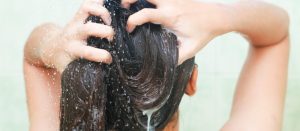
Hair rinse is a well known means of hair care. It was used by our grandmothers regularly. Nowadays, we tend to depart from this method, claiming that it takes too much time. You couldn’t have been more wrong. Not only hair rinses are extremely easy to prepare but also include natural ingredients, which often work better than hundreds clogging, silicone drugstore products. The process of preparation usually takes a few minutes. I would like to encourage you to try out this method of care. Here are a few important tips on how to do it.
1. Water – priceless component of hair rinses.
Boiled or demineralised water is considered as the main ingredient in almost every hair rinse. Hard water increases the roughness and stiffness of your hair.
2. Keep track of the expiration date of the hair rinse.
The best are always fresh rinses, however, it will cause no harm if you decide to store it in the refrigerator for no longer than 3 days.
3. Cold closes hair cuticles.
This is why it is always worth using a cool rinse, especially because it is the last step in your hair care. The rinse is applied to freshly washed and conditioned hair.
4. Do not worry, fortunately, you will not have to lean over a bowl of your rinse and for hours soak your hair in it. It is only important to allow the hair absorb as much essential ingredients contained in the rinse, as they can take. A short massage will work wonders to your scalp and hair. The entire treatment can last about five minutes. Then, you may pour gently and slowly, the rest of the rinse over your hair.
What products are recommended for hair rinse?
The possibilities are unlimited. You must always remember about a liquid base that will make pouring the mixture over the hair a lot easier. Water, where you can brew the herbs, is the major base, ingredient. Other valuable hair rinse components are: coconut milk, honey, aloe juice, flaxseed, lemon juice, apple vinegar, wine vinegar, natural oils (almond, sesame oil, amla, jojoba, avocado, argan, etc.). When it comes to the herbs, nettle, sage or chamomile are the most common ones.











